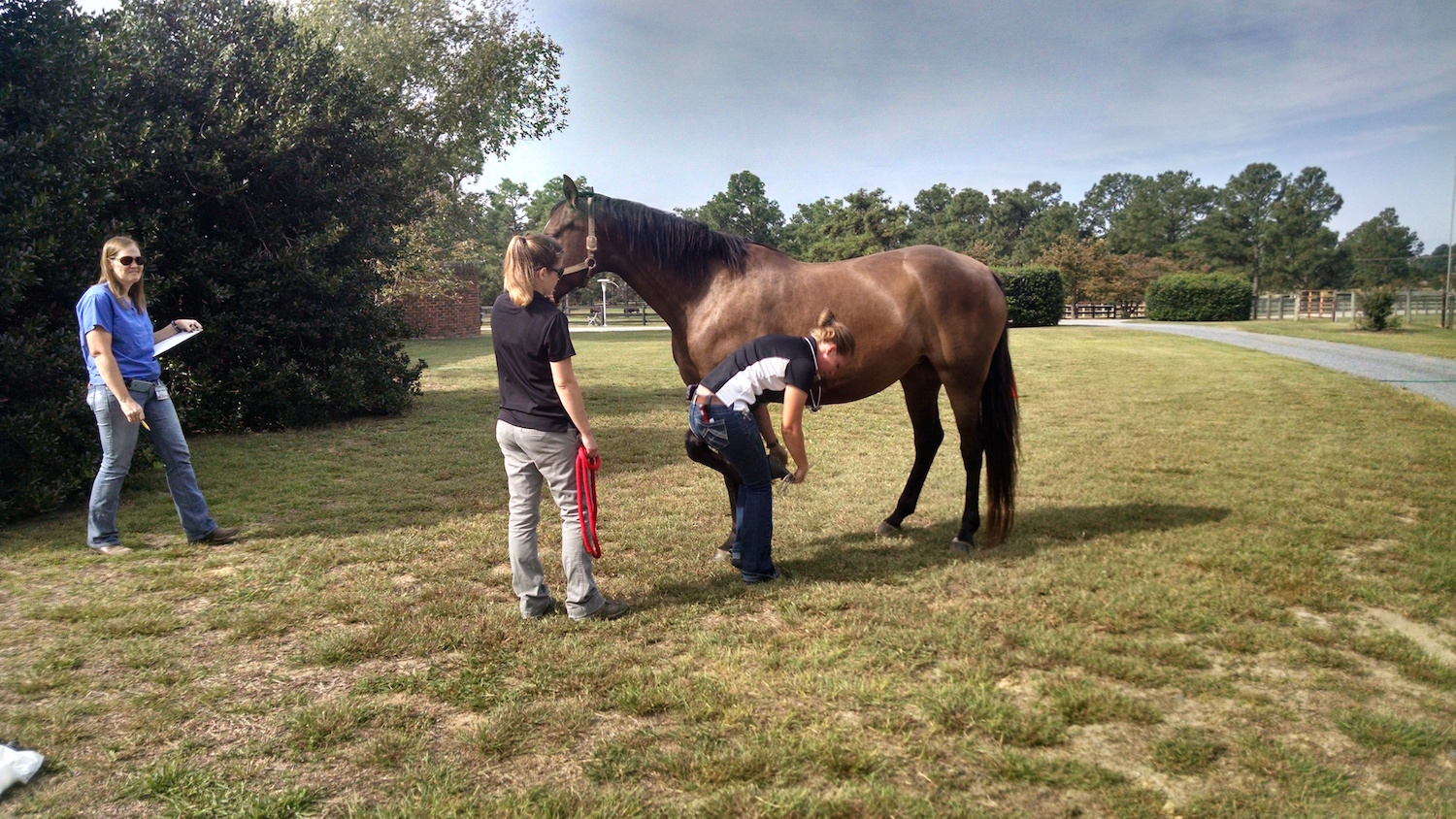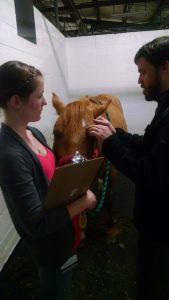A Work in Progress: Pioneering Distributive Training in VMC 949

Assistant Professor of Equine Primary Care Katie Sheats joined the College of Veterinary Medicine in 2015 to teach a four-week course that uses a hybrid model of distributed clinical training.
“Traditionally, ‘distributed clinical training’ relies on private medical professionals to provide students with ‘real-world’ clinical experience. The NC State CVM’s Equine Primary Care program is a hybrid distributed model that takes advantage of both campus-based and community-based learning to give students opportunities to interact with and care for authentic clients and patients,” said Sheats.

In the Equine Primary Care (VMC 949) course for Doctor of Veterinary Medicine (DVM) students, one week is spent supervised by Sheats and three weeks are spent in the field with a private practice veterinarian who is a designated partner in the program.
According to Sheats, the program has great opportunities to expose students to a real-world setting. “It lets them practice their skills and interact with diverse patients and clients that they’ll be servicing when they leave school,” she said.
Sheats applied for a DELTA Grant to create a more connected community of educators for equine primary care. “I saw the DELTA Blended Learning Grant as an opportunity to bring some technologically based solutions that would enhance and support student learning to the program,” she said.
Instructional Challenges and Solutions
Students enrolled in the course must become proficient in seven core competencies and more than 100 skills while at their community-based sites. A majority of the skills have to be performed multiple times which results in large amounts of data. These data sets need a place to be stored and easily accessed by students and faculty.
In addition, with a new innovative model in veterinary medicine comes challenges such as communication barriers between the student, community-based sites and NC State. Since there is distance between community-based sites and NC State, some information may not be properly communicated to students or faculty.
A team of DELTA staff members are working to create two key deliverables for this project to reach Sheats’ goals of a new approach to tracking competencies and a way to reduce barriers to communication. Innovative use of the Moodle mobile app and an onboarding training module are currently in the works.
“One of my main goals was for this tracking and communication site to be mobile friendly because my students learn in a field-based environment and drive around in a truck, so the mobility of the technology was very important,” said Sheats.
Veterinary Education Tracker App
Lead Instructional Designer Bethanne Tobey and a team of DELTA applications development staff are working to use the Moodle mobile app to create a centralized location to track competencies and skills for VMC 949. The app will be called the Veterinary Education Tracker (VET) app but will still be based through Moodle which students are already familiar with.

While out in the field learning and practicing, students can easily access the app to check off and document evidence of a skill when completed. The app will be accessible without an internet connection, so when students are in rural areas, they can still use the app offline and their work will upload once they are back online.
Not only will the app be a place to track competencies, but it will also allow students to submit photos as evidence of completing a skill.
Tobey and the DELTA team are exploring using the database feature in the Moodle mobile app as the place to store all the competency information. The database will allow for multiple entries, since many competencies are completed more than once, and it can track evidence as well.
“If a required skill is ‘to obtain a medical history of a patient,’ the student can take a picture of the chart and upload it directly in the text editor of the database and submit it right from their mobile device,” said Tobey. Once the student submits the evidence, the instructor will be notified and can check if it has been proficiently completed.
Onboarding Training Module
Since the program has not been formalized prior to this project, the onboarding training module will give new and existing clinical partners a formal introduction to the program.
The onboarding training module serves to inform each practice partner of their expectations, roles and responsibilities to ensure students are receiving the best instruction possible at each community-based site. It also gives practice partners a way to learn about the new app and become familiar with their avenues for communication between students and faculty.
As a formalized introduction that all practice partners must complete, the onboarding module will aim to ensure all students are receiving the same instruction. There are eight community-based sites, so not all students will visit the same sites and receive the same training. “The onboarding module will help to standardize the expectations of the student experience and learning outcomes at each of those sites,” said Sheats.
According to Tobey, the onboarding training module is currently in development stages. The content has been written, and it is being wire-framed. Once it is completely laid out, then populating the content will begin.
Contributing to Student Success
“This project has the potential to have a big impact for a lot of people. In the vet world, Katie is the first to embrace this level of competency tracking,” said Tobey. She also mentioned that not only is this project something that hasn’t been done before, it is being done for the first time with already supported university-wide tools.

The key deliverables will be remarkably beneficial for students, faculty and practice partners. “Students will be able to track their own progress, and it will be great for the practice partners to begin seeing tangible evidence of student learning,” said Sheats.
“The app will also be amazing for faculty at the university to not only monitor student’s learning but also their experiences at each of the different practices,” said Sheats. She noted it will provide feedback on multiple levels and will be very iterative of how the program grows and improves moving forward.
Sheats explained there is a challenge in veterinary training because the patient cases at veterinary hospitals where students are trained are often extremely complex and are not always the best for teaching entry-level veterinary knowledge and skills. “With the distributive model, we have the ability to be sure that we are teaching students about the types of cases they will see on work day one following graduation,” said Sheats.
“DELTA has been such an amazing resource — a welcoming place for someone who’s never been involved in this type of project,” said Sheats. She noted seeing her ideas executed is very encouraging for her career and what she can accomplish in terms of educational goals for her students.


